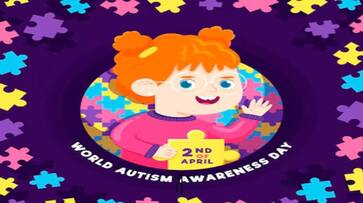Every April, world observes World Autism Month, which starts on April 2 with the UN-approved World Autism Awareness Day.
April 2nd is recognized annually as Autism Awareness Day. It's time to consider and discuss the rights of those with autism. Autism typically develops in childhood and persists into adulthood.
What is Autism?
Autism spectrum disorder is a developmental impairment brought on by differences in the brain (ASD). A known difference, such as a hereditary disease, exists in some individuals with ASD. Unidentified causes still exist. According to scientists, there are several factors that contribute to ASD and work together to alter the typical ways that people develop. Regarding these factors and their effects on individuals with ASD, there is still a lot we do not know.
Theme:
Every year, the UN selects a theme for Autism Day to promote awareness. The motif for World Autism Day in 2024 is blue, which stands for acceptance and understanding. The colorful motif aims to dispel the myth that people with autism live dull, restricted lives.
History:
A disorder called autism spectrum disorder has an impact on a person's behavior and communication. In 1911, a physician used the term "autism" to refer to a set of symptoms. Drs. Leo Kanner and Hans Asperger made significant contributions to our understanding of autism in the 1940s. World Autism Awareness Day was formally instituted by the UN in 2007 with the goal of fostering global discourse on ASD and providing funding for research into the illness.
Traditions of the Day:
The main aim is to spread knowledge about autism and recognize the tenacity of those who deal with the illness on Autism Awareness Day. Children are taught about autism in schools, and this encourages them to be accepting and empathetic. It's crucial that everyone be considerate of and include autistic children because some of them experience bullying. Local companies support initiatives related to autism by donating a portion of their profits.
Importance of the day:
While there isn't a treatment for ASD, there are ways to support it. Early diagnosis is crucial. It's critical to comprehend and embrace those with autism. Since each person is different, it's critical to accept and value their perspective on the world. Although there is no proven treatment for autism, research suggests that activities that promote independence may improve daily abilities and reduce symptoms.
Last Updated Apr 1, 2024, 3:28 PM IST









![Salman Khan sets stage on fire for Anant Ambani, Radhika Merchant pre-wedding festivities [WATCH] ATG](https://static-gi.asianetnews.com/images/01hr1hh8y86gvb4kbqgnyhc0w0/whatsapp-image-2024-03-03-at-12-24-37-pm_100x60xt.jpg)
![Pregnant Deepika Padukone dances with Ranveer Singh at Anant Ambani, Radhika Merchant pre-wedding bash [WATCH] ATG](https://static-gi.asianetnews.com/images/01hr1ffyd3nzqzgm6ba0k87vr8/whatsapp-image-2024-03-03-at-11-45-35-am_100x60xt.jpg)


